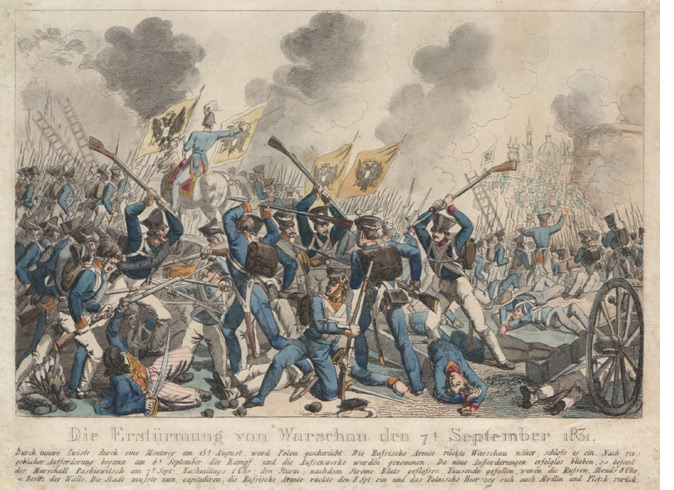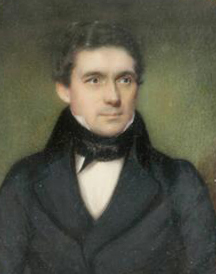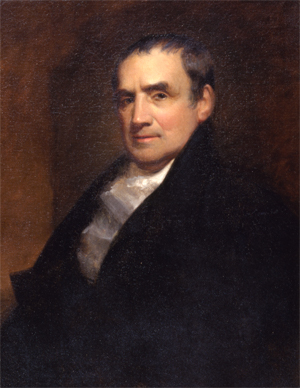Polish Political Exiles and the Legacy of the American Revolution in the Antebellum US
by Derek Kane O'Leary
 In the second of the Cabinet rap battles in Lin-Manuel Miranda’s Hamilton (2015), Thomas Jefferson and Alexander Hamilton wage a fiery debate in 1796 about whether the US should honor its old treaty obligations to a newly revolutionary France in its war against Britain. Closing, and winning, the contest, Hamilton asks Jefferson,
In the second of the Cabinet rap battles in Lin-Manuel Miranda’s Hamilton (2015), Thomas Jefferson and Alexander Hamilton wage a fiery debate in 1796 about whether the US should honor its old treaty obligations to a newly revolutionary France in its war against Britain. Closing, and winning, the contest, Hamilton asks Jefferson,
If we try to fight in every revolution in the world, we never stop, where do we draw the line?
By 1834, one possible answer to this lingering question was “Poland.” Within a few short years, Poland’s 1830 November Uprising against autocratic Russian rule had been applauded by Americans, quashed by Tsar Nicholas, and lamented in the US as an ill-fated attempt to secure Poland’s equal rights as a nation. While Americans had gone to greater lengths in the 1820s to support the successful independence struggles across Spanish America and in Greece, the Polish revolutionaries ultimately fell beyond the line of what the US government and most American citizens would fight for.
 When Alexander Hill Everett—accomplished diplomat and intellectual—addressed an audience at Faneuil Hall in 1834, he was at pains to convince them that even though Poland’s national struggle had stalled in Eastern Europe, Americans had a historic responsibility to the more than two hundred Polish political exiles who had just landed in the US. The event in the hallowed building was meant to celebrate the anniversary of the Ancient and Honorable Artillery Company, the renowned Massachusetts military organization that had served in every major American conflict from the Pequot War (1637–1638), through the American Revolution, and into the antebellum period. Everett seized the occasion to urge the Company to reflect on their responsibility to these exiled foreign revolutionaries. “If there be any other country on the globe to which the Polish exiles had a right, in the hour of their adversity, to turn their steps for consolation and sympathy,” he argued, “it was to this, of which the soil was moistened by the blood of their fathers, poured out in defence of our liberty and independence.” Famed military leaders such as Casimir Pulaski and Tadeusz Kościuszko had bled for America’s independence, and their Polish descendants in Warsaw had staged a new battle in the ongoing war between liberty and despotism, as Everett and many others saw it. How, Everett asked, had the Company and Americans as a whole responded to Poland’s struggle for independence? Would Americans, he wondered, live up to their duty toward refugees from a conflict fought in the spirit of America’s own Revolution when they washed up on its shores?
When Alexander Hill Everett—accomplished diplomat and intellectual—addressed an audience at Faneuil Hall in 1834, he was at pains to convince them that even though Poland’s national struggle had stalled in Eastern Europe, Americans had a historic responsibility to the more than two hundred Polish political exiles who had just landed in the US. The event in the hallowed building was meant to celebrate the anniversary of the Ancient and Honorable Artillery Company, the renowned Massachusetts military organization that had served in every major American conflict from the Pequot War (1637–1638), through the American Revolution, and into the antebellum period. Everett seized the occasion to urge the Company to reflect on their responsibility to these exiled foreign revolutionaries. “If there be any other country on the globe to which the Polish exiles had a right, in the hour of their adversity, to turn their steps for consolation and sympathy,” he argued, “it was to this, of which the soil was moistened by the blood of their fathers, poured out in defence of our liberty and independence.” Famed military leaders such as Casimir Pulaski and Tadeusz Kościuszko had bled for America’s independence, and their Polish descendants in Warsaw had staged a new battle in the ongoing war between liberty and despotism, as Everett and many others saw it. How, Everett asked, had the Company and Americans as a whole responded to Poland’s struggle for independence? Would Americans, he wondered, live up to their duty toward refugees from a conflict fought in the spirit of America’s own Revolution when they washed up on its shores?
The November Uprising erupted in Warsaw in 1830 in defense of Poland’s constitutional rights under the rule of Russia, which had won control of the newly created Kingdom of Poland in the 1815 Congress of Vienna. Led throughout 1831 by a cadre of military officers against vastly superior Russian forces, the Polish nationalist struggle absorbed the attention of sympathizers across Western Europe and in the US. Americans avidly followed the latest troop movements, poring over the minutely reported triumphs and contretemps of military leaders on battlefields that they had never heard of, but which became household names. Accounts of Russian atrocities and Polish heroism filled newspaper columns. Voluntary societies and organizations like the Ancient and Honorable Artillery Company raised funds and roused Americans to support the Polish cause. Many, like Everett, felt a sentimental bond and a historical debt to the “countrymen of Kościuszko and Pulaski.” Even as the Polish attempt to secure its sovereignty seemed doomed, Americans proclaimed their faith in Poland’s ultimate success. But after 234 Polish refugees arrived in the US in the early spring of 1834, a small transatlantic branch of the much larger diaspora of Polish revolutionaries stretching out between Siberia and Western Europe, it was clear that Polish revolutionaries would no longer carry the torch of America’s revolutionary legacy in Eastern Europe.
In Faneuil Hall, Everett drew the attention of his audience toward several Polish revolutionaries who had been “actively engaged in the late attempt at revolution in Poland” but now sat in exile among them. Although he told the audience that the Polish refugees sought only “temporary refuge among us,” he, they, and everyone else in the room understood that the Polish fight for self-determination against the massive empire of Tsar Nicholas was futile. Also clear to Everett and his audience were the limits of the US government’s support for this foreign independence movement, no matter its links with America’s own founding. When it came to US foreign policy toward Poland and Russia, Everett bit his lip. Despite the impassioned public outcry since 1831 against Russia’s policy in Eastern Europe, President Andrew Jackson insisted that his new minister to Tsar Nicholas, the future president James Buchanan, should secure a bilateral commercial deal that would link these two sprawling territorial empires by maritime trade. Despite all odds, Buchanan succeeded in late 1832, and the Senate unanimously ratified the treaty in early 1833. “It might not be quite suitable,” Everett insinuated, “on a public occasion of this kind to enlarge upon the character of the late events in Poland, or to go into considerations applicable to the conduct of foreign powers in amity with the United States.” Everett ostensibly steered clear of criticizing the treatment of the Poles by Tsar Nicholas’s Russia—an American ally, for which President Jackson had expressed his deep friendship. But his message to the crowd in Faneuil Hall was unambiguous: whatever our government’s policy, we as citizens have responsibilities toward a foreign people who have fought for their equality in the name of our founding.
Everett worried that Americans’ sympathy for the Polish cause had lapsed and he let his audience know it. When American pro-Polish sentiment was at its peak in 1831, Bostonians had gathered in Faneuil Hall to generate support for the revolutionaries in Warsaw. “You doubtless recollect, Mr. Commander, the beautifully painted Polish standards, which on that occasion, were displayed in this Hall and after having been carried in procession through the city, were transmitted to Europe by the hands of one of our country-men.” In a time well before Americans could easily change their profile image on Instagram in support of a cause like Black Lives Matter or the defense of Ukraine, “the Young Men of Boston” waved actual banners in support of Poland. Yet Everett suggested that these flags had been lowered and forgotten just as quickly as one might remove a black square or yellow and blue flag from their Instagram account. Against this tendency, Everett urged his listeners to stand by their own proclamations about America’s responsibility toward the Poles, even if the winds of geopolitics had turned against them. Everett’s call to action echoed in other cities, such as  Philadelphia, where influential printer Mathew Carey reminded his readers that “you are fully informed of the glorious self-devotion with which ‘their lives, their fortunes, and their sacred honor’ were pledged for that which you all regard as dearer than life— the freedom of their country.” For Polish advocates like Everett and Carey, Americans’ commitment to their own sacred founding principles was on the line.
Philadelphia, where influential printer Mathew Carey reminded his readers that “you are fully informed of the glorious self-devotion with which ‘their lives, their fortunes, and their sacred honor’ were pledged for that which you all regard as dearer than life— the freedom of their country.” For Polish advocates like Everett and Carey, Americans’ commitment to their own sacred founding principles was on the line.
The Polish political exiles who landed in the US in 1834 faced this waning interest in their cause, not to mention the many challenges of integrating into a swiftly changing country that was in stark contrast to the world they knew. In the coming years, they would work their way into the far corners of America’s empire, from eastern cities to the urban frontier of Kentucky in the 1840s, from the battlefields of the expansionist war against Mexico to the boom town San Francisco in the 1850s. However, for young and disoriented immigrants in the 1830s who rarely spoke English and brought few easily marketable skills, leveraging their link with the legacy of the American Revolution was often crucial to securing their place as equals—if not among the community of independent nations, then as individuals within their new country. Everett shared a statement by one Polish refugee present in Faneuil Hall, a Mr. Mierzynski. “If any thing can console us in exile from our beloved Poland, it is that we can at least sigh freely in the home of freedom. . . . Long continuance to the free Institutions of the United States; —if preserved in their purity, they must secure the prosperity of the people.”
As Everett’s and Mierzynski’s comments implied, the reception of Polish political refugees reflected—for better or worse—Americans’ commitment to their own founding principles and the durability of their “free Institutions” a half-century after their nation’s independence. The Nullification Crisis (1831–1833) had recently challenged federal authority and national unity, reverberating all the way to the court of Tsar Nicholas, who worried about its impact on US-Russian trade. Overruling both its Supreme Court and treaty obligations, the US violently enforced its authority over Indigenous land across its own western frontier, deporting thousands of American Indians. To those assembled in Faneuil Hall, those “free Institutions” may well have seemed at risk. Americans’ treatment of foreigners, Everett and Mierzynski suggested, revealed something important about Americans’ own identity and values at that uncertain moment in the nation’s history, as their first great war of ideals faded from view and another began to appear on the horizon.
In the classroom, the parallels between Americans’ engagement with the Polish cause in the 1830s and recent US foreign policy present an opportunity for students to engage with deeper historical questions: about the functioning of civil society in the US, the meaning and responsibilities of global citizenship, and the relationship between the struggle for justice and equality in the US and Americans’ ability to promote these ideals abroad. For instance, comparing and contrasting Alexander Hill Everett’s 1834 address with a recent statement in support of Afghan or Ukrainian refugees would enable students to ask challenging questions about history and civics: What are America’s founding principles, and what responsibilities do these entail for US foreign affairs and immigration policy? How should individuals, civil society, and the government support foreign movements and individuals fighting in the name of America’s founding principles? To what extent does the abiding struggle for justice and equality in the US influence Americans’ ability to support these principles around the world? Putting the little-known story of Poland’s political exiles into conversation with current affairs can help students reflect on their own relationship with these enduring and challenging questions.
Derek Kane O’Leary received his PhD in History from the University of California, Berkeley in 2020. He is a Postdoctoral Teaching Fellow at the University of South Carolina and the author of many articles, including “Accessing Archives in the Nineteenth-Century Atlantic World,” Houghton Library Blog (February 2019).
Further reading
Davis, David Brion. Revolutions: Reflections on American Equality and Foreign Liberations. Cambridge, Mass.: Harvard University Press, 1990.
Fitz, Caitlin. Our Sister Republics: The United States in an Age of American Revolutions. New York: W. W. Norton & Co., 2016.
Lerski, Jerzy Jan. A Polish Chapter in Jacksonian America: The United States and the Polish Exiles of 1831. Madison: University of Wisconsin Press, 1958.
Santelli, Maureen Connors. The Greek Fire: American-Ottoman Relations and Democratic Fervor in the Age of Revolutions. Ithaca, NY: Cornell University Press, 2020.
Primary sources
Carey, Mathew, et al. “Appeal in Behalf of the Expatriated Poles!” Hazard’s Register of Pennsylvania, May 17, 1834. Proquest American Periodicals.
Everett, Alexander Hill. “The Poles.” Christian Register, June 14, 1834. Proquest American Periodicals.









































































